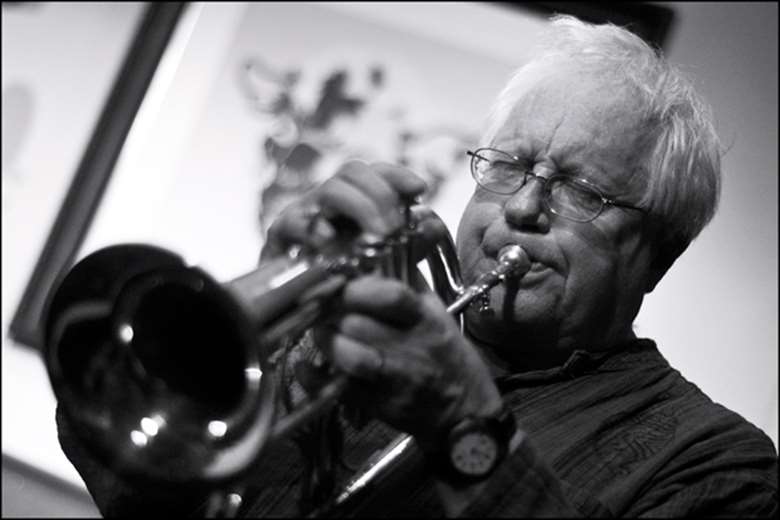Henry Lowther’s Still Waters run deep at Lauderdale House
Tuesday, May 12, 2015
Election night fervour may have been evident elsewhere but this small-ish audience sought their pleasure [or consolation] in the relatively sober company of Still Waters, a Henry Lowther-led quintet of some standing.

“All my favourite players,” said Henry.
Was it celebratory or a matter of commiseration to open with ‘Can’t Believe, Won’t Believe’? Either way, this was a relatively solemn piece, melded together with ‘I’ll Be Glad’, a piece whose sentiment was unexplained. Lowther’s trumpet attack is always poised and never fanciful, his tone centred and unwavering, the playing sometimes evoking a classical command. I just don’t think it’s in Henry’s nature to blast out and scare the pants off you, his playing more a matter of careful consideration.
Pete Hurt’s soprano on this was quite agitated: this solo typical of many that we heard on the night, the remainder on tenor. He plays long lines, making me think of Warne Marsh, changing direction often but never losing the way, this emphasising the long-held view that he’s a musician who is definitely underrated yet very satisfying to hear, his solos often concluding in an assertive and at times edgy fashion. Pianist Barry Green is another whose playing falls into the best-kept-secret category, always fiery, often impassioned, helped along here by name-sake bassist Dave Green and the rather oddly assorted percussive effects offered by the omni-active Paul Clarvis. Clarvis plays a set of drums that looks as if it might have been acquired from charity shops and car boot sales bit by bit, sits bolt upright and finds every possible way of striking every part of it. Yes, he can swing but most of the time doesn’t seek to.
Hurt’s ‘Capricorn’, a temporary title apparently, had a zig-zag construction, nicely voiced, eliciting strong stuff from BG and DG, with Hurt himself warm-toned on tenor, his solo gradually unfurling like one of those magicians who pulls an endless line of bunting from his hat. Lowther’s ‘Quadrant’ had a Latin feel, almost danceable in fact, quite playful but never out of control, Hurt nearer to Rollins in his solo. Then came Lowther’s version of Victor Feldman’s lovely ‘Summer Night’, the trumpeter Harmon-muted, peaceful and sublime.
The session’s most animated moments came on John Lewis’ boppish ‘Afternoon in Paris’, the front-liners full-on, this for me, at least, the best thing of the evening. If Lowther’s compositions were often complex, like ‘Fractal’, with its almost mathematical precision and the ballad-like ‘Segment’, the quintet seemed at one with it all. More measured than exultant, this was music that deserved our concentration and I’m glad I heard it.
– Peter Vacher